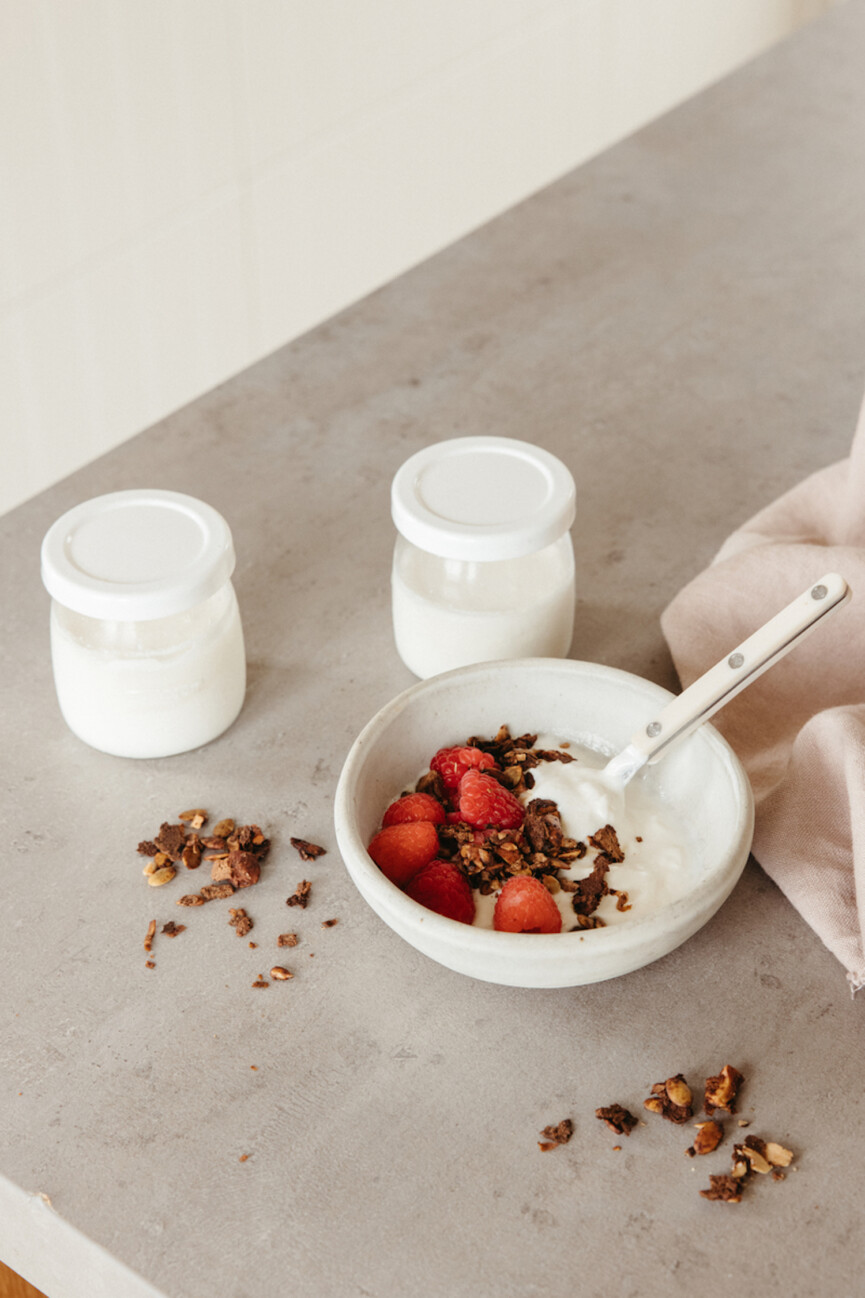You’ve invested in the perfect mattress, blackout curtains, and ditched your phone before bedtime (kudos!). You’ve created a wind-down routine you look forward to. You’ve even designed your sleep haven for the ultimate snooze! Yet despite your efforts, a restful night’s sleep remains out of reach. Been there, experienced that. What if I told you the culprit might be on your plate—not in your bedroom? The missing puzzle piece is hiding in plain sight: your diet. Before Daylight Savings rolls around, let’s dive into the often-overlooked connection between diet and sleep. Specifically, sneaky food sensitivities sabotaging your slumber. Yes, adjusting your diet could be the key to unlocking better, uninterrupted sleep.
Featured image from our interview with Inge Theron by Michelle Nash.
Edie Horstman
Edie is the founder of nutrition coaching business, Wellness with Edie. With her background and expertise, she specializes in women’s health, including fertility, hormone balance, and postpartum wellness.
The Surprising Link: Food Sensitivities and Sleep
Unlike food allergies—which trigger an immediate and sometimes severe reaction—sensitivities tend to fly under the radar. They don’t usually cause an obvious, in-the-moment response. But over time, they quietly wreak havoc on your body. Hello, sleep problems. These sensitivities lead to everything from inflammation and hormonal imbalances to digestive woes. All of which inevitably interfere with your ability to get proper rest.

How Your Diet Could Be Undermining Your Sleep
Here’s the kicker: you could be sensitive to foods you consume (every day) without realizing it. For instance, that seemingly harmless morning latte or your favorite sandwich could be undermining your sleep quality. Eventually, undiagnosed sensitivities can disrupt your ability to sleep. As a result, you find yourself tossing and turning, struggling to wake up rested. Fortunately, it may only take a dietary adjustment (or two) to significantly improve your sleep quality—and overall well-being.
The Inflamation-Sleep-Anxiety Cycle
When you eat something your body’s sensitive to, it triggers inflammation. This isn’t the acute kind that causes visible swelling. It’s a low-grade, chronic inflammation that simmers beneath the surface. This inflammation can disrupt your sleep patterns, making it harder to fall asleep or stay asleep throughout the night. And we all know what happens when we don’t sleep well—anxiety comes knocking. This creates a vicious cycle: poor sleep increases anxiety, which in turn makes it even harder to sleep.

7 Common Food Sensitivities That Impact Sleep
As mentioned, sensitivities tend to produce more subtle (although chronic) symptoms. But before you know it, these sensitivities can disrupt your sleep patterns and overall rest. Curious to know the top offenders when it comes to diet and sleep? As a Nutrition Consultant, I frequently observe these common food sensitivities in my clients:
1. Dairy
First up, dairy products. Think milk, cheese, and yogurt. More specifically, it’s the two main proteins in cow’s milk: casein—found in the solid part of milk that curdles—and whey, found in the liquid part of milk that remains after milk curdles. These create issues for those with lactose intolerance and/or dairy sensitivities. Symptoms like bloating, gas, and stomach discomfort can make drifting off to sleep a challenge. Plus, dairy can sometimes lead to excess mucus production, which might result in snoring (and frequent wake-ups) throughout the night.
Love the taste and consistency of dairy? Try lactose-free cottage cheese, coconut yogurt, or flax milk—all of which mimic the goodness of dairy without the side effects.

2. Gluten
Celiac disease aside, gluten—the protein present in wheat, barley, and rye—is problematic for those with gluten sensitivity. Gluten can trigger an inflammatory response, and this response disrupts sleep-regulating hormones. A snowball effect, this leads to gastrointestinal symptoms that interfere with sleep quality. But even if you don’t have a diagnosed sensitivity, gluten can still cause gastrointestinal distress that impacts sleep.
Try a grain-free diet or switch your go-to packaged bread for organic sourdough (ideally from a local baker or homemade!).

3. Eggs
Notice digestive issues (bloating, gas, or diarrhea, etc.), skin reactions (like hives or eczema), or respiratory symptoms (such as congestion or coughing) after eating eggs? You might have a sensitivity. These adverse reactions can create discomfort—even if you eat them for breakfast and not dinner—that makes it challenging to fall asleep.
Before you kiss eggs goodbye, swap high-quality eggs (pasture-raised) as these chickens are raised in healthier, more natural environments. Additionally, cook your eggs thoroughly. Heat alters the structure of egg proteins, potentially reducing their allergenic properties. Lastly, test different egg varieties—if you have access to them—to see if that improves your tolerance (e.g., duck eggs).
4. Soy
While soy products (tofu, tempeh, soy milk, and edamame) are healthy, they can cause reactions. Here’s a closer look at soy’s impact on diet and sleep:
- Glycemic impact. Soy products can affect blood sugar levels. And these fluctuations affect sleep quality!
- Soy protein. Soy contains proteins that can act as allergens. The proteins—particularly glycinin and beta-conglycinin—can trigger immune responses (manifesting as bloating, gas, and diarrhea).
- Phytates. Soybeans contain phytates, which are compounds that can interfere with mineral absorption. This interference can contribute to nutritional imbalances and potentially affect overall health (including sleep).
- Isoflavones: Soy products are rich in isoflavones—plant-based compounds with estrogen-like properties. For those with hormone-sensitive conditions or imbalances, this can potentially lead to disruptions in sleep patterns, contributing to symptoms like hot flashes or mood swings.
- Lectins. Last but not least, soybeans contain lectins. These are proteins that bind to the lining of the digestive tract and potentially cause inflammation or irritation. This irritation can result in gastrointestinal symptoms that disrupt sleep.

5. Nuts
Nuts (peanuts and tree nuts, like cashews and walnuts) are well-known allergens that can trigger a range of reactions. With symptoms/histamine reactions like hives, itching, or swelling, falling asleep is both uncomfortable and challenging. Addititonally, although nuts are high in nutrients like healthy fats and fiber, these things can irritate the digestive tract because they’re hard to digest—especially when consumed in large doses before bed.
6. Citrus Fruits
While citrus fruits might not be common allergens, they can still cause trouble for some! Namely, oranges, grapefruits, and lemons. The acidity in these fruits can lead to acid reflux, where stomach acid flows back up into the esophagus—especially when you lie down. This can cause a burning sensation, keeping you awake and disrupting sleep. If you notice that citrus fruits are affecting your rest, it might help to cut back on them (particularly in the evening).
Enjoy noshing on fruit? Try switching to cherries (if they’re in season), peaches, kiwis, banana, and berries. These options are rich in everything from melatonin and serotonin to magnesium and antioxidants. All of which can regulate sleep patterns and support your sleep-wake rhythm.
7. Artificial Additives and Preservatives
Last but not least, artificial ingredients. Artificial additives and preservatives in ultra-processed foods can mess with your sleep. Think artificial colors, flavors, and too much sodium (which are often added to make food last longer and taste better!). However, these additives can upset your stomach or cause allergic reactions. In turn, making it hard to fall asleep or stay asleep. High sodium levels can also lead to water retention and higher blood pressure, which can make you wake up frequently during the night. Choosing whole, less processed foods can help avoid these problems.
Ditch the high-carb cereal for grain-free granola, boxed cookies for these oatmeal chocolate chip delights, high-sugar bars for a cleaner protein bar option, or a few medjool dates stuffed with nut butter and flaky salt.

Suspect you might have food sensitivies?
If you think food sensitivities might be affecting your sleep, consider keeping a food diary to track what you eat and how you feel. Identifying and eliminating problematic foods could easily boost your sleep quality. All of that said, how do you know if food sensitivities are messing with your sleep? Look out for these signs:
- Fatigue, even after a full night’s sleep
- Difficulty falling asleep or staying asleep
- Mood swings or increased anxiety
- Digestive issues like bloating or gas
- Skin problems like eczema or acne
- Headaches or brain fog

Beyond Food: Blood Sugar and Sleep
To bring this full circle, let’s not forget about blood sugar. Those late-night snacks or sugary desserts can cause your blood sugar to spike and crash during the night, leading to restless sleep. Try to eat a balanced dinner with 20-40 grams protein, 1-2 sources of healthy fats, and fiber-rich carbs, like butternut squash or black beans. If you enjoy having a bedtime snack, opt for something like a handful of nuts with berries, a piece of sharp cheddar cheese with dark chocolate, or chia pudding with nut butter. Your best night’s sleep is just a meal (or snack) away!
https://camillestyles.com/wellness/diet-and-sleep/”>
#Chronically #Tired #Diet #Blame
